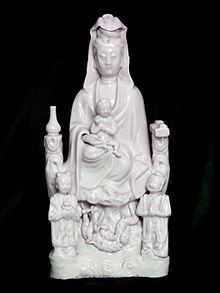


Hakuji (白磁) is a form of Japanese pottery and porcelain, normally white porcelain, which originated as an imitation of Chinese Dehua porcelain. Today the term is used in Japan to refer to plain white porcelain.
It is always plain white without colored patterns and is often seen as bowls, tea pots, cups and other Japanese tableware. It was also used for small figurines, mostly for Buddhist and sometimes Christian religious figures and Japanese genre figures. Like other plain wares, it was appropriate use for various types of vessels for religious use. It was originally developed for the Japanese market, but became one of Japanese export porcelain.